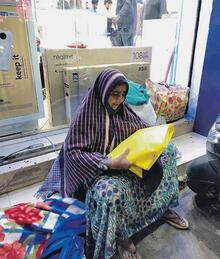
Divya Shanthi Church, School and Community Services grew out of St John’s Church ( Church of South India) Bangalore, India as a mission initiative to serve poor families in North Bangalore.
Impact of Covid
By mid-August only 10% of India’s 100 million people had been vaccinated. Infections swept India and Bangalore from mid-April, peaking in May and sustaining a high level of infections till mid-June. When the infection moves to villages in the rural areas the whole of a district’s Christian leadership is at risk of being wiped out.
Divya Shanthi was selected as a vaccination centre, on average vaccinating 145 people each day. This was stopped temporarily, as a local politician appeared to have objected to the municipal corporation partnering an overtly Christian organisation. Vaccinations started again in September and were running at 190 or so a day, but the daily supply of vaccines from the state authorities was still uncertain.
In their Covid relief programme, food and provisions were delivered to several thousand poor people each day. Many men and women lost employment due to Covid and developed health problems which prevented them returning to work.
In the Divya Shanthi school of almost 500 children, teaching continued online during Covid. In the new school year, from June, so far only 40% have returned to class. Most students, who come from poor families, are from other faiths. Several hundred past students are in Bangalore, have done well, are in good jobs and have overcome poverty.
During October heavy rains lashed Bangalore every day, considerably extending the annual rainy season. These destroyed the flimsy huts of poor people. The church provided roofing and other materials to 200 families. The rain held off for the church’s harvest celebration on 10 October and 500 people were able to take part. £4,000 was raised in cash, groceries and vegetables which enabled 200 families to receive a month’s supply of groceries and vegetables. Much of the church’s work among poor families is supported by gifts from local business people.
Holistic care
The holistic care team of 12 people consists of pastors, health workers and social workers. Since mid-May they have focused on the care of poor families badly affected by Covid. The stress is on post-Covid care. The team is doing thorough surveys of over 500 families where one or more members had Covid and recovered and some had fatalities among their family.
The effect on such families is devastating. Most are still struggling to return to paid employment or self-employment. In most cases both husband and wife are not employed or earning. Several families who had sustainable incomes before Covid have gone into debt from money lenders charging extortionate rates of interest. Several hundred families have been pushed back into poverty and heavy debt.
The photo shows a homeless mother who sleeps with her children in front of the shop once it shuts at 11pm. She was just given the plastic sheet on which she will sleep on the blanket next to her given last week. 200 families sleeping on the streets have been helped so far. The church will try and do more as people help.
The team is working with debt management, ensuring food provisions, health care, and assisting in finding employment.
Online services
Fear marks the lives of people in the church and community who require a good deal of pastoral care and support. The church’s worship services continue to be online and are well attended. Youth, Young Adult, Women’s, and Men’s groups have all been meeting online regularly.
https://www.e-n.org.uk/2022/01/world-news/covid-wipeout-fears-but-church-serves/?search=1
